Who doesn’t need to make his lawn unique and gorgeously green? If you lost your test on the regular lawn that becomes brown so often, I have a solution for you, and I am sure that you will love it. Try making a lawn with clover plants. Yes, it’s the same plant you are thinking about. The lucky plant is your favorite lawn plant. However, clover lawns have numerous benefits too.
Clover plants have small flowers of different colors, and the leaves are not like grass. So, it will give you a completely new look on your lawn. But it’s the same reason; many people don’t like clover lawns. However, check the photos I have attached here and think if you like them.
If your test on lawns matches this idea, you should invest a few minutes in learning everything about clover lawns. And here, you will get everything from the advantages and disadvantages of this kind of lawn to how to build it. So, tie your seatbelt and start your journey to the clover lawns.
What is a Clover Lawn?
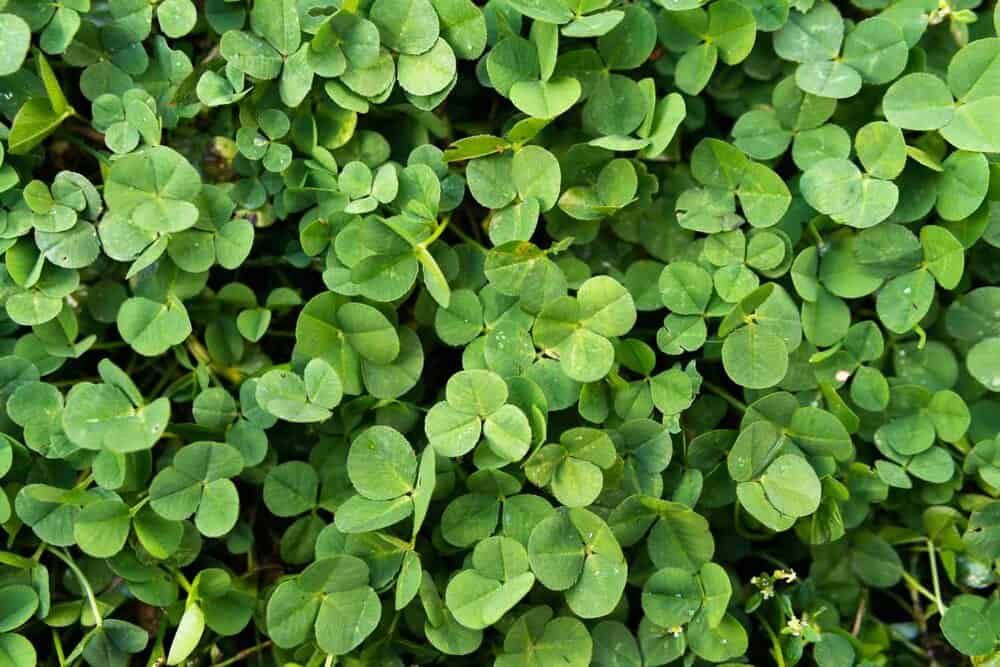 Usually, we find lawns full of grass that cover the ground. There can be different types of grass on the lawn. But there is another plant that people grow to cover the ground that is actually not grass. That’s clover; the three leaves shrub you often count as a lucky charm when it gets an extra leaf.
Usually, we find lawns full of grass that cover the ground. There can be different types of grass on the lawn. But there is another plant that people grow to cover the ground that is actually not grass. That’s clover; the three leaves shrub you often count as a lucky charm when it gets an extra leaf.
However, clover is a very popular plant that many people prefer to grow on their lawns instead of grass. The main reason behind it is that it requires less maintenance and mowing and has a better tolerance. Additionally, a clover lawn looks different from a grass lawn, and the owners don’t need to mow the lawn so often as well.
Unlike most grass types, clover lawns look greener and don’t lose color in any season. Also, clover has small white flowers that look nice when they bloom all over the lawn. So, many people prefer clover over different species of grasses.
Types of Clovers for Lawns
Initially, the clover plant can be of more than half of a hundred species. But all of them are not suitable for making lawns. There are two essentially different groups of clovers that are good for your lawn. They are the perennial and annual clovers.
But people, most of the time, categorize clover plants into three types. This category is made based on the color of the clover flowers. So, these three categories are even more popular than the categories of species.
Eventually, when you buy seeds of clovers for preparing the lawn, you will have to ask the seller about these three types. Besides, another type of clover has different sizes of leaves. So, in total, there are four types.
1. White Clover
 The clover plants that have white color flowers are known as the white clover. The scientific name of this plant is Trifolium repens. Most people use this kind of clover plant on their lawns because it is a very hardy plant that won’t die so easily. However, white clover needs low maintenance and can stay healthy and green in the cold.
The clover plants that have white color flowers are known as the white clover. The scientific name of this plant is Trifolium repens. Most people use this kind of clover plant on their lawns because it is a very hardy plant that won’t die so easily. However, white clover needs low maintenance and can stay healthy and green in the cold.
White clover is a little bit sensitive to heat. The ideal temperature for this plant is from 50 to 85 degrees Fahrenheit. This clover grows well with some other grass, including Kentucky bluegrass, tall fescues, and perennial ryegrass.
2. Red Clovers
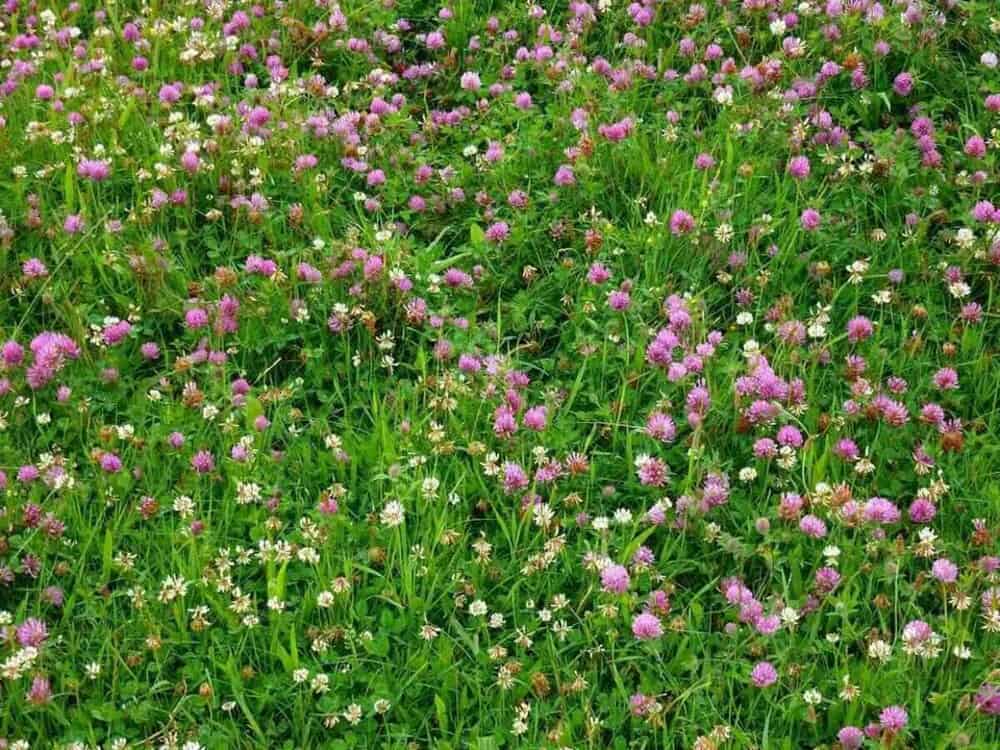 Basically, the flower of this kind of clover plant is dark magenta and sometimes red. Still, people call it the red clovers. The scientific name of this clover is Trifolium pratense, and people call it by other names like cow clover, wild clover, and meadow clover.
Basically, the flower of this kind of clover plant is dark magenta and sometimes red. Still, people call it the red clovers. The scientific name of this clover is Trifolium pratense, and people call it by other names like cow clover, wild clover, and meadow clover.
In comparison to most other clovers, this one grows longer. It needs very low maintenance, and it has high drought tolerance capabilities. If the soil has a good drainage system, this kind of clover can last longer than you expect. But it can die within a year if it is too cold outside.
People usually avoid using this kind of clover to grow on their lawns because of its growth and usual look. Some people don’t like how it looks on the lawn. But it is completely safe for pets and kids. Eventually, people use this plant as medicine for asthma, gout, Whooping cough, etc.
3. Strawberry Clovers
 And the third one is the strawberry Clovers. In this case, the flowers look like strawberries as they are baby pink and white in color. However, this is also a common clover plant used widely to make lawns. This plant is also very disease resistant, but sometimes it is affected by a fungal infection.
And the third one is the strawberry Clovers. In this case, the flowers look like strawberries as they are baby pink and white in color. However, this is also a common clover plant used widely to make lawns. This plant is also very disease resistant, but sometimes it is affected by a fungal infection.
Just like the white clover, this one grows well in winter. It can die in excessive heat. Also, it grows well between 50 to 80 degrees Fahrenheit. Strawberry Clovers don’t grow high, and you don’t need to cut them so often. Also, growing and keeping your lawn greener doesn’t need much.
4. Microclover
 Aside from the above types, there is another type of clover that many people plant in their yards. It is micro clover and has a very small leaf and flowers. These tiny flowers are white in color and it’s almost one-fourth in size of the white clover’s flowers. This type of clover is ideal if you love spending more time on the lawn, as it is soft and small.
Aside from the above types, there is another type of clover that many people plant in their yards. It is micro clover and has a very small leaf and flowers. These tiny flowers are white in color and it’s almost one-fourth in size of the white clover’s flowers. This type of clover is ideal if you love spending more time on the lawn, as it is soft and small.
So, these are the different types of clovers you can plant on your ground unless you like the texture of a clover lawn. Clover lawns usually look greener and thicker than grass lawns. Also, they have better disease resistance too.
Grass Vs. Clover Lawns
 For sure, a grass lawn and a clover lawn are two completely different types. They share many dissimilarities too. Before choosing clovers as your lawn plant, you should know them very well. It will help you make the right decision on it.
For sure, a grass lawn and a clover lawn are two completely different types. They share many dissimilarities too. Before choosing clovers as your lawn plant, you should know them very well. It will help you make the right decision on it.
|
Clover |
Grass |
| Clover lawns are made of only clover plants. | Grass lawns are made of different types of grasses. |
| Clovers have a few species, so they can be of many types. | Grasses for the lawn can be of more than a hundred types. |
| Clovers are good to plant and grow in any season. | Not all grasses are suitable for all seasons. |
| Clover lawns don’t need mowing so often. | Grass lawns need frequent mowing. It can be twice a week in the case of some grass species. |
| Clovers never grow higher and won’t make a bush so easily. | Grasses grow higher and can be a bush so easily. |
| Clover Lawns don’t need high maintenance at all. | Most grass lawns need high maintenance. |
| Clover lawns can have small white flowers. | Most grass lawn doesn’t have flowers. |
| Clover lawns are not harmful to pets. | Some grass species are harmful to pets. |
| The texture of a clover lawn is not smoother. | The texture of a grass lawn is smoother than a clover lawn. |
Benefits of Having Clover Lawns
 Most people choose a clover lawn because of its endless benefits. Usually, it needs less maintenance and has higher disease tolerance capabilities. However, people in rural areas often choose this lawn plant because it can grow without any care.
Most people choose a clover lawn because of its endless benefits. Usually, it needs less maintenance and has higher disease tolerance capabilities. However, people in rural areas often choose this lawn plant because it can grow without any care.
If you are a beginner, you must be confused about this fact. Choosing the right plant for your lawn is pretty much harder. However, we cannot say anything if you have a choice of any other grass species. But if you are thinking about clover, the following points will help you learn about all the beneficial sides of having a clover lawn.
1. Clover is a Low Maintenance Plant
Almost everyone will suggest you go for clovers if you ask someone about the best lawn plants that grow without the high maintenance. Clover leaves can hold moisture for weeks, so if you cannot water it timely, it won’t die so easily.
Also, like the grasses, it won’t grow higher. So you don’t need to mow the lawn every week. Clovers can grow all season and don’t need seasonal fertilizers. Instead, it provides additional nutrients to the soil. Also, you don’t need to add weedkiller on the lawn as clover doesn’t let weeds grow so frequently.
2. Prevent Soil Erosion and Pollution
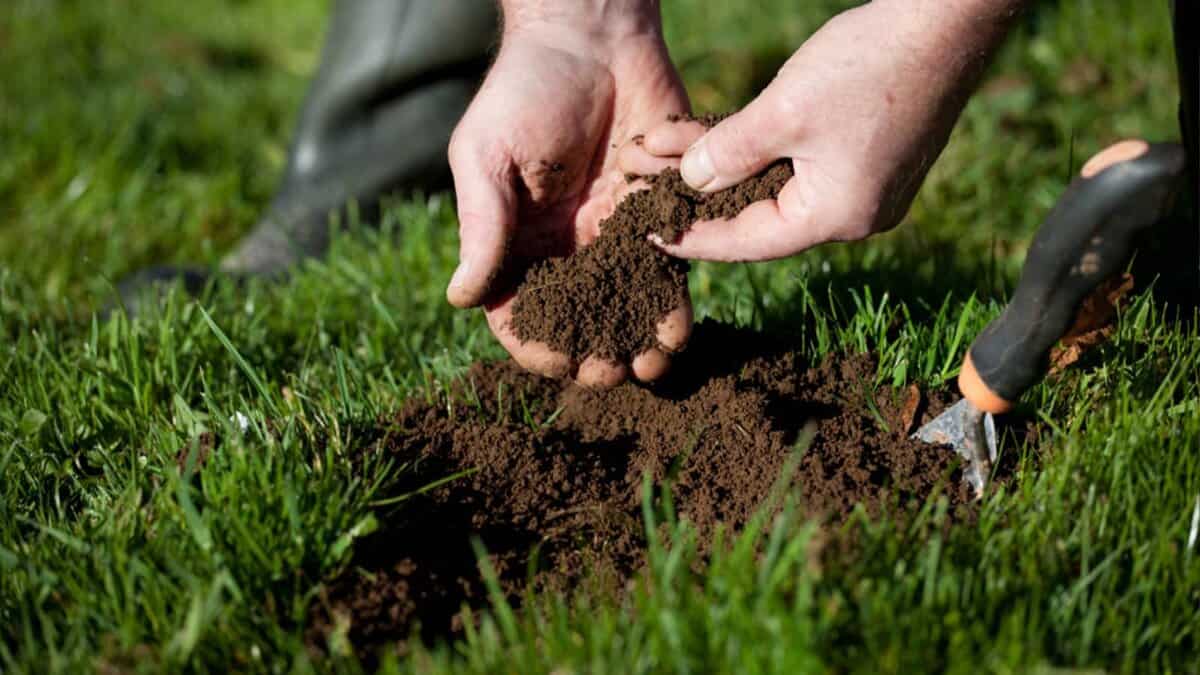 Clover lawns are very effective in reducing both soil erosion and soil pollution. The yard in front of your house can be dry and hardy when it doesn’t have enough nutrients and elements to consume water.
Clover lawns are very effective in reducing both soil erosion and soil pollution. The yard in front of your house can be dry and hardy when it doesn’t have enough nutrients and elements to consume water.
The roots of a clover tree can reach up to 2 feet and help the soil get enough nutrients and water. Also, the layer of clover saves the land from the different polluting elements.
3. Environment-friendly
You must choose a completely environment-friendly plant if you have pets and kids at your home. Not all the species of grass are good in this case, unlike the clovers. The common types of clovers that people use to plant in the yard are not poisonous or harmful to kids and pets.
Eventually, clover lawns have fewer weeds than other types of lawns. As a result, there will be less chance of growing harmful weeds on the lawn when clovers cover it. Also, clover lawns are good for the soil and the environment too.
4. Prevent Growing Weeds
 Most grass lawns grow different types of weeds, which is a big problem for any lawn owner. However, clover has a good name for preventing growing weeds. But it doesn’t mean that it won’t grow any weed. Usually, clovers won’t grow too many weeds. It simply blocks the entire ground, and new weeds won’t get space to grow.
Most grass lawns grow different types of weeds, which is a big problem for any lawn owner. However, clover has a good name for preventing growing weeds. But it doesn’t mean that it won’t grow any weed. Usually, clovers won’t grow too many weeds. It simply blocks the entire ground, and new weeds won’t get space to grow.
Besides, most clover plants’ roots can grow too long inside the ground. Sometimes, it can reach almost two feet in the ground. So, this kind of plant keeps a balance in the ground and makes its territory. Thus, it prevents growing another plant from ruining the beauty of your lawn.
5. Edible Plants
Not just being environmentally friendly, most clover types are edible too. You can eat the fresh leaves as salad and also use them to garnish your food. Some people use clover leaves to decorate the food as well. In many places, people cook clover leaves to make delicious foods.
Not just for decoration, clovers have rich nutrient factors too. This kind of leaf is full of protein and many essential minerals for the human body. Eventually, people use them to make herbal medicine for different diseases like asthma, cancer, bronchitis, etc. So, the leaves are not just edible; they are good at curing too.
6. Fix the Nitrogen Level in the Soil
Another unique benefit of having a clover lawn is that your lawn won’t be in need of nitrogen. The plant has a special element that produces nitrogen that is suitable for the ground. So, it will help your ground to be fertile and healthy. Essentially, clover plants are very good for the health of the soil and keep it erosion free.
7. Keep the Lawn Greener
Finally, a clover lawn is good for you if you wish to have a greener lawn al;l around a year. Unlike most grass species, clover plants stay alive all the seasons. When most grass lawns become thinner and lose their consistency, the clover lawns stay fresh and keep your lawn greener all around the year.
As you see, clover lawns need less care, fertilizer, water, and maintenance. You don’t need to mow it so often as well. That’s why if you are busy and don’t have enough time to take care of your lawn, it is better for you to go for a clover lawn instead of a grass lawn. If you are interested, the following pointers will help you make a clover lawn by yourself.
How to Plant Clover Lawns?
 People with experience making a grass lawn are often confused about how to build a clover lawn. For sure, the process is a little bit different. For a grass lawn, most people choose turf, and it is very easy to set the turf and build the lawn overnight. But for clovers, you cannot go for tufting.
People with experience making a grass lawn are often confused about how to build a clover lawn. For sure, the process is a little bit different. For a grass lawn, most people choose turf, and it is very easy to set the turf and build the lawn overnight. But for clovers, you cannot go for tufting.
Clovers grow from the seeds. So, it needs a different process from turfing. I have divided the entire process into a few steps to make things easier for you. Make sure to follow the steps one after another and maintain the sequence. I am sure you will plant a nice green clover lawn in your yard.
Step 1: Selection of Clovers
As you have already learned, clover plants can be of different types. So, you first need to choose the right type of clover plants for your lawn. You can recheck the types again to choose the type. In this case, you should consider your area’s temperature, the environment, and your preference.
Step 2: Prepare Soil for Clover Lawn
In the next step, you have to prepare the soil for your new clover lawn. To prepare the soil for your lawn, you have to start working a week. You need to clean the ground and remove all the trash and pebbles. Then you have to use a fork to move the soil. Also, you have to water it twice a week and one day before spreading the seeds.
Step 3: Arrange for the Soil Test
 Before you spread the seeds, you need to test the soil and make sure that the soil is suitable for the clover seeds. Generally, clover plants release nitrogen into the soil. But the seeds need enough nutrients to germinate properly. So, you need to test the lawn soil and ensure that it is suitable for the seeds.
Before you spread the seeds, you need to test the soil and make sure that the soil is suitable for the clover seeds. Generally, clover plants release nitrogen into the soil. But the seeds need enough nutrients to germinate properly. So, you need to test the lawn soil and ensure that it is suitable for the seeds.
Step 4: Spread Seeds
Next, you have to spread seeds all over the ground. You can buy seeds from your nearby agriculture shop. On the sack of the seed, you will find a chart of the amount you need for every hundred square feet of the ground. So, make sure to calculate the amount of seeds and buy enough to spread them eventually. You should buy the best broadcast spreader if you have a larger lawn.
Step 5: Rake the Soil
After you spread the seeds, you have to rake the soil properly. In this case, make sure to turn over the soil so that the seeds go under a layer of it. But don’t do it too harshly. Otherwise, the seeds will break, and they won’t germinate. You can take a rake or garden fork and then gently go through the ground.
Step 6: Water the Ground
Next, you have to water the ground. You can either turn on the sprinkler on the lawn or just use a hose to water it. At this phase, you need to water the ground once every two or three days. Make sure to water regularly until the seed germinates. After that, you have to change the watering schedule.
So, this is the process you should follow to make a clover lawn. The process is simple and not much different from making a grass-seed lawn. Clover plants don’t need much water and fertilizer, so you can skip watering daily after the seeds germinate.
How to Take Care of Clover Lawns?
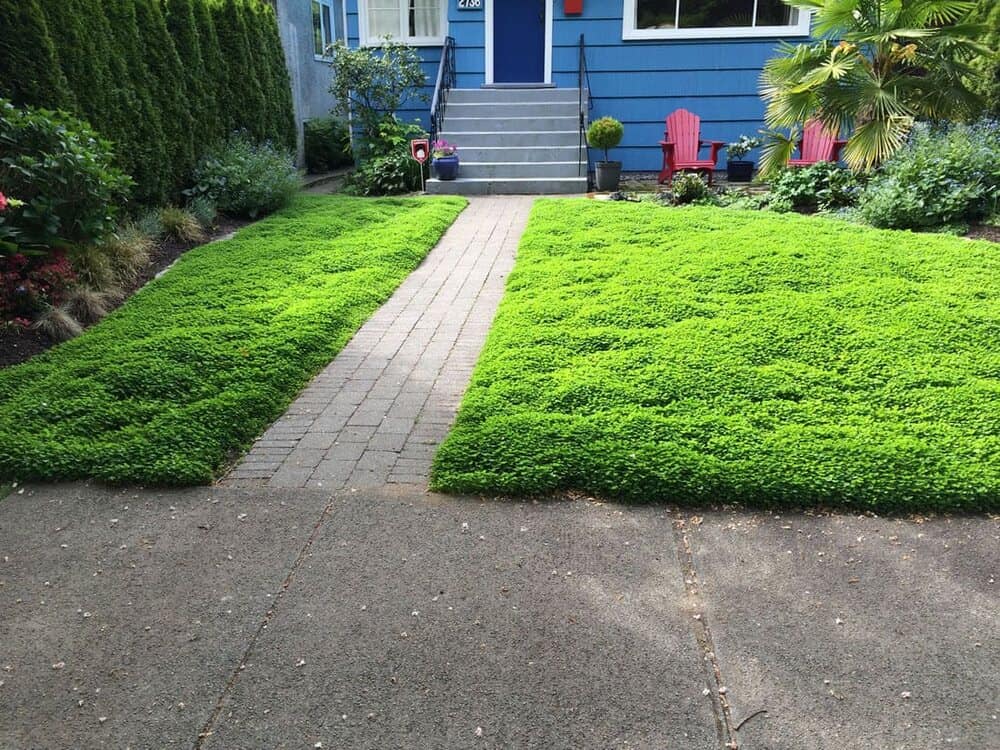 A clover lawn requires less maintenance, but it doesn’t mean that it doesn’t need any. It will usually die if you leave your clover lawn for months without taking care of it. You need to water it weekly and take care of it carefully. The following points will help you take care of your lawn.
A clover lawn requires less maintenance, but it doesn’t mean that it doesn’t need any. It will usually die if you leave your clover lawn for months without taking care of it. You need to water it weekly and take care of it carefully. The following points will help you take care of your lawn.
- Water the Lawn Timely: Generally, clover plants don’t need too much water. Still, you need to ensure water the lawn at least once a week to keep them fresh and healthy.
- Ensure Full or Part Sunshine: If you are planting a clover lawn, choose a place that gets full or partial sunshine. Remember that clover lawns love sunshine.
- Ensure a Better Water Drainage: Clover plants cannot service in overwatered land. So, it is essential to ensure a better drainage system so that the plants can live healthily.
- Reseed the Lawn Sometimes: If you have micro clover lawns, you need to reseed the lawn frequently. Other types of clovers need reseeding once in three to four months as well.
- Never Use Herbicides: Some people think using herbicides on clover lawns is the most dangerous thing for your lawn. Clover itself is a herb, and a herbicide can kill them all.
- Never Use Nitrogen-rich Fertilizer: As I have already said, clover plants can produce and release nitrogen to the soil; you shouldn’t use a fertilizer that is rich in nitrogen. It is suggested to test the soil and select the nutrients accordingly.
- Mow the Lawn Once A Month: Initially, clover lawns don’t need mowing so often. But you must mow it when it is more than 3 to 5 inches. It is good to mow regularly in the growing seasons.
Besides, you should frequently apply lawn foods and organic fertilizers to keep the plants green and alive. You shouldn’t skip watering the lawn too long and apply fertilizer once or twice a year.
Disadvantages of Having Clover Lawns
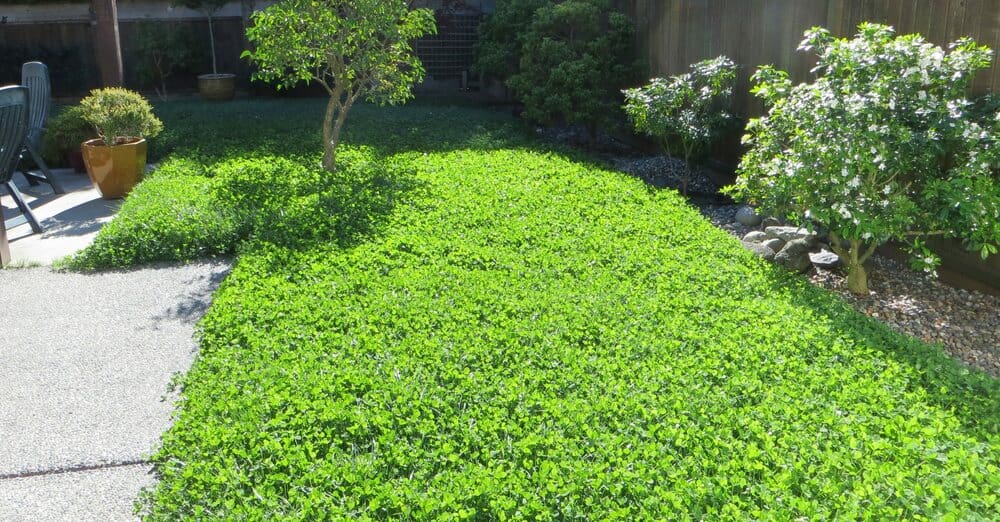 You have learned almost everything about clover lawns. But there are some disadvantages to having this kind of lawn as well. And you should learn about them for sure. Don’t forget to check them out in the below points.
You have learned almost everything about clover lawns. But there are some disadvantages to having this kind of lawn as well. And you should learn about them for sure. Don’t forget to check them out in the below points.
- Most people don’t like the texture of clover lawns as they are not smoother than grass lawns.
- People are not interested in choosing clover instead of grass for their lawn because of the flowers of the clover plants.
- Some of them are allergic to clover plants.
- You need to reseed the ground so often if it’s a clover lawn.
- Excessive foot traffic on a clover lawn can decrease the growth of the plants.
- Clover flowers attract bees and other insects.
- Clover plants cannot survive well in excessive heat temperatures.
So, before you try making a clover lawn, you should check some real pictures of the lawn and make sure that you will love it. Also, be sure about the mentioned fact before you start making the lawn. Remember that making a clover lawn requires a lot of money and effort. So, decide carefully before you start.
FAQ
Q: Is clover good for the soil?
A: Yes, clover is essential for the soil as it works as a natural compost and releases nitrogen to enrich soil fertility. Making a clover lawn also improves the quality of the soil and rescues soil erosion and pollution. Clovers on your grass lawn are also good unless the clover plants cover the entire area.
Q: Does clover lawn need high maintenance?
A: Not at all. Clover lawns don’t need high maintenance or care. You can simply water it timely and provide lawn food frequently. You don’t need to provide nitrogen fertilizer or herbicide on the lawn. Eventually, it doesn’t require mowing so often.
Q: Do I need a mower for a clover lawn?
A: A clover lawn doesn’t need frequent mowing. Still, you should have a mower at your home for the lawn. When the plants are long, especially in the growing seasons, you will need to mow them. So, if your lawn is medium in size, you can buy a reel mower for it as you don’t need to use it so often.
Q: Is clover poisonous?
A: Clover plants that are used to make a lawn are not poisonous. Eventually, they are used to make medicines. But there are some unusual types of clovers that mainly grow as weeds and can be poisonous and harmful to your pets and kids.
Q: What kind of clovers are good for making a lawn?
A: There are different types of clover plants; white clovers and micro clovers are the best options for making lawns. You can use red and strawberry clovers too. But you cannot just use any type of clover. It’s because most of them are not suitable for making lawns other than the four types of clover.
Final Thought
Though it seems a little bit unusual, clover lawns are very beneficial and require almost no maintenance. You need to water it once a week or every ten days and provide some food occasionally. It doesn’t need fertilizers, herbicides, or even weedkillers.
Clover grass usually prevents producing weeds and helps keep the soil balance. Also, these plants are environment-friendly and good for the ecosystem. You can even eat the leaves, which are safe for kids and pets. Also, there are tons of benefits to growing clovers on your lawn.
Now, it’s all up to you whether you would like to grow clover on your lawn or not. I cannot say if you like the appearance, but on the other side, it’s all good and safe. Make sure to let us know about your experience and thoughts about clover lawns. Thank you.
